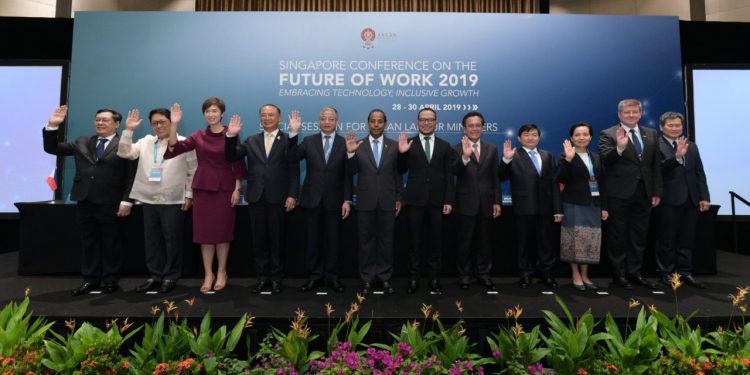Members of ASEAN will come together to start a regional platform to prepare for the future work landscape.
Manpower Minister Josephine Teo shared this at the Future of Work Conference on 29 April 2019.
The idea for the initiative was mooted by Singapore and discussed with ASEAN leaders at the conference.
Some 700 international delegates attended the conference organised by Ministry of Manpower, NTUC and the Singapore National Employers Federation (SNEF).
The platform will benefit ASEAN states by bringing together international experts and regional stakeholders to share and develop the region’s capabilities through workshops, seminars and courses.
“With the support of ILO [International Labour Organization] and our ASEAN colleagues, Singapore is happy to do its part and help get this initiative going,” she said.
For a start, Mrs Teo suggested that ASEAN can focus on tripartism to find win-win solutions and thrive collectively in the future of work, workplace safety and health for decent, sustainable work; and embrace technology for inclusive growth.
“We are excited to work with our tripartite partners – NTUC and SNEF, and will also engage our partners, including ASEAN, ILO and other stakeholders to explore further how to bring this idea to fruition,” added Mrs Teo.
Collective Commitment
Ten ASEAN member states, including Singapore, signed a statement on the future of work.
In it, the countries committed to enable their public and private workforce to take advantage of new technology and increase training standards; increase participation of women and those with disabilities in the workforce; encourage efforts of businesses; and share best practices among ASEAN member states.
“The great advantage for ASEAN is that our economies are growing. If this were not so, it would be harder to look to the future with a sense of hope,” said Mrs Teo.
Currently, ASEAN is the world’s fifth largest economy, with 640 million people.
The region’s economy has also grown by an average of 5.3 per cent annually since 2000, which is above the world’s average of 3.8 per cent.
The last 20 years have also seen the region’s GDP quadruple to about US$2.7 trillion today, according to Singapore’s Department of Statistics.
However, Mrs Teo warned that the member states must also look at the challenges the region is facing. They include demographic shifts with the decline in total fertility rate, the role of technology in a changing job landscape, and climate change.
“Our efforts today will determine whether our societies continue to progress, where our people get the chance to improve economic security, fulfil their human potential and enjoy social justice,” she said.

